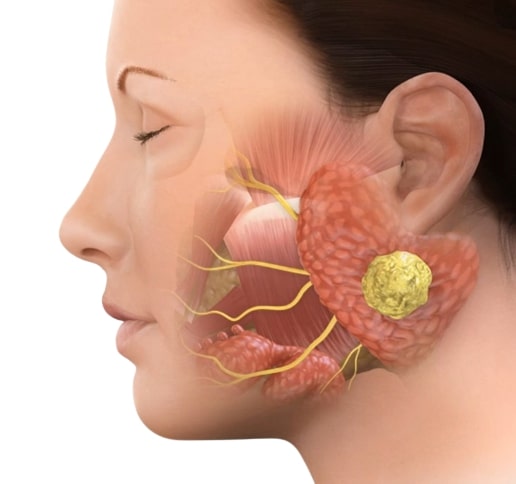Parotidectomy
What is parotidectomy?
 The parotid gland is removed partly or entirely in a surgical procedure known as a parotidectomy. The parotid gland is a main salivary gland and can be affected by a variety of diseases, such as stones, chronic infections or benign or malignant tumors. parotidectomy may be performed to treat these conditions or to prevent recurrent infections.
The parotid gland is removed partly or entirely in a surgical procedure known as a parotidectomy. The parotid gland is a main salivary gland and can be affected by a variety of diseases, such as stones, chronic infections or benign or malignant tumors. parotidectomy may be performed to treat these conditions or to prevent recurrent infections.
What are the goals of surgery?
The goals of surgery vary depending on the type of surgery and the disease being treated. Here are some examples of the goals of surgery:
Improve the quality of care provided to patients undergoing surgery.
Establish minimum standards of skills necessary for surgeons.
Restore a physiological function or an organ function.
Reconstruct appearance (breast reconstruction, facial reconstruction after surgery, etc.).
To reduce the side effects of other treatments, such as after radiotherapy.
Maintain an essential function that has been affected by disease.
Relieve symptoms.
What are the indications for a parotidectomy?
The following are indications for a parotidectomy:
Tumors in the parotid gland that can be benign or malignant.
Cysts or lymph nodes.
Persistent parotid gland disorders.
Frey syndrome.
How does the surgery take place?
The parotid gland is removed partly or entirely in a surgical procedure known as parotidectomy. The stages of parotidectomy are as follows:
Parotidectomy is usually performed under general anesthesia.
The cut is made in front of the ear and goes up to the neck.
The parotid gland is severed from its nerve branches, the artery and the facial vein.
Removal of the parotid gland: the deep part of the gland is removed and its nerve branches are cut.
What is the duration of the intervention?
The duration of a parotidectomy varies depending on the complexity of the procedure and how quickly the patient heals. The procedure generally lasts between 2 and 3 hours.
What are the surgical consequences?
Parotidectomy results may be moderate and may include the following:
Pain: Pain after surgery is usually moderate and can be alleviated with pain medication.
It is common to feel discomfort in the operated area.
Bleeding may persist for the next few days, especially during meals or oral hygiene.
Loss of sensitivity: A loss of sensitivity in the cheek and pinna of the ear will be normal and will improve with time.
Transient chewing difficulties: Transient chewing difficulties may occur.
Transient salivary leak: There may be transient salivary leakage.
What are the advantages ?
Parotidectomy has benefits such as the following:
Tumor removal: Parotidectomy is a surgical procedure that involves removing benign or malignant tumors from the parotid gland .
Reliable diagnosis: Pathological examination of the removed tissue allows an accurate diagnosis to be made and appropriate treatment to be started if necessary.
Persistent infections of the parotid gland can be treated with parotidectomy.
Treatment of Frey syndrome: Frey syndrome, a rare disease characterized by excessive facial sweating when chewing, can be treated by parotidectomy.
What are the risks ?
The risks and precautions that should be taken during a parotidectomy include:
Risk of facial paralysis: Facial paralysis is the main risk due to the presence of the facial nerve which passes through the gland .This nerve allows motor skills in half of the face.
Risk of bleeding: There may be bleeding or hematoma which requires reoperation.
Risk of recurrence: The lesional nature of the tumor can lead to recurrence.
The risk of infection is low, but it can occur.
Risk of pain: Pain after surgery is generally moderate and can be alleviated by pain medication.
Risk of aesthetic complications: removal of the gland can result in a hollow in front of and under the ear.
Risk of functional complications: Temporary chewing problems and salivary leakage may occur.
Complications related to general anesthesia can occur, although they are rare.
How does recovery work and how long does it last?
Recovery after a parotidectomy varies depending on the complexity of the procedure and how quickly the patient recovers from the operation. The following should be considered for recovery:
Pain: Pain after surgery is usually moderate and can be alleviated with pain medication.
It is common to feel discomfort in the operated area.
Bleeding may persist for the next few days, especially during meals or oral hygiene.
Loss of sensitivity: It is normal for the sensitivity of the cheek and pinna to decrease over time .
Temporary chewing problems may occur.
Transient salivary leakage may occur.
Potential risks of complications: The complexity of the procedure and the speed of healing of the patient determine the risks of the surgical procedure. Significant complications remain rare.